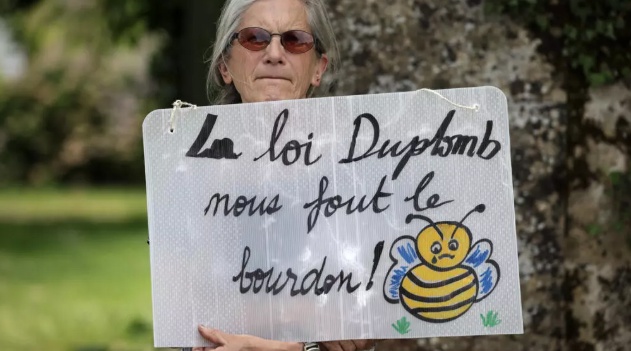A recently passed law in France allowing the limited use of a previously banned pesticide sparked public outrage on Thursday. Critics warned that it could cause serious damage to the environment and human health.
A petition has been submitted to the French parliament, or National Assembly, demanding a debate on the so-called “Duplomb law,” named after the senator who introduced it.
The petition, supported by environmental organisations and opposition figures, has gathered nearly 2 million signatures.
More than a year after France was swept by farmers’ protests in early 2024, tractors reappeared outside the Bourbon Palace at the end of May. This time, the aim was not to demonstrate discontent, but to support a new law known as the “Dupont law.” This bill, drafted by Senator and farmer Laurent Duplomb, is intended to be a response to the dire situation in the agricultural sector. Its main goal is to “remove restrictions that hinder farming,” in particular by simplifying the process of obtaining permits for the construction of water storage facilities and increasing livestock limits.
However, one of the bill’s provisions has become the focus of heated debate: the reinstatement of acetamiprid, a pesticide from the neonicotinoid family. This substance, which is harmful to pollinating insects, was banned in France in 2018. This decision has angered beet and hazelnut producers, who claim there are no alternatives for controlling pests such as aphids.
The proposal to reinstate the pesticide, albeit with restrictions, immediately sparked a wave of criticism, with a petition against it gathering more than 1.8 million signatures. In fact, the case of acetamiprid illustrates a broader confrontation on the European stage. The substance, which is banned in France, remains authorised in other 26 EU member states until 2033. This allows agricultural products grown using this pesticide to be imported into France, undermining the competitiveness of national producers.
French farmers are calling for harmonisation of standards, pointing to “overregulation” at national level compared to European standards. However, the problems facing French agriculture run deeper than simply a disagreement with Europe over a single pesticide.
“You can solve regulatory problems and authorise certain plant protection products as much as you like, but the fact remains that a significant part of our competitiveness depends on adapting to global demand, differences in production costs and, in sectors such as fruit and vegetables, higher labour costs,” emphasises Thierry Pouch, head of economic research at the French Chambers of Agriculture. In his opinion, the “Duplomb law” is an attempt to put out a fire without dealing with the smouldering embers.
Statistics confirm the existence of a systemic crisis: the number of farms in France continues to decline, and the trade balance in the agricultural sector is deteriorating. Over the past twenty years, the country has fallen from second to fifth place in the list of global agricultural exporters. Even more worrying is that two-thirds of these market losses are linked to a decline in competitiveness. The most vulnerable sectors are fruit and vegetable production, which cannot compete with Spain and Morocco, and poultry farming, where production has fallen by 20% since 2020 despite growth in domestic consumption.
A decline in production has even been observed in the dairy industry, despite an increase in purchase prices. Opponents of the law call it a “deviation from scientific, environmental and medical standards.”
Critics argue that the law does not address key issues facing farmers, such as low wages and unfair competition. However, the government is defending the move, citing the use of chemicals in other European countries and emphasising their importance for France’s “food sovereignty.”
The bill, which lifts some restrictions on the use of pesticides in agriculture, was introduced in November 2024.
